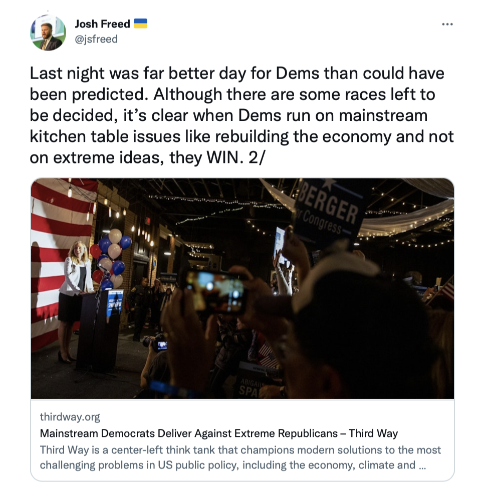On the Grid: Running From the Extremes 11/10/22

Click HERE to subscribe to this weekly newsletter.
Tuesday’s election results weren’t a clean and clear repudiation of Republican extremism, but it was the best outcome one could have reasonably hoped for, and we’re proud of the role that Third Way played in the outcome.
As Axios and UC Santa Barbara’s American Presidency Project note, since 1934, the party of incumbent presidents averaged 24 House and 4 Senate seat defeats in the midterm elections. Despite the drag of 8 percent inflation, President Joe Biden and Democrats defied the odds and history. With key races yet to be called, control for both the House and Senate is still up for grabs. There is a lot at stake, especially for the Biden Administration’s climate and clean energy agenda. Third Way has a new memo outlining key takeaways from Tuesday’s election. We’ve included a couple below that are particularly relevant:
- Mainstream beat extreme: Democrats largely nominated moderates, and Republicans mostly picked MAGA extremists. Moderates won for governor in Michigan, Wisconsin, and Pennsylvania and defended Senate seats in Colorado, New Hampshire, and (hopefully) Arizona. In the House, the New Democrats took far fewer losses than they feared and FLIPPED six new seats. The extremists won in deep-red places, but even there, many moderate Ds massively outperformed expectations in states like Ohio and North Carolina. And there was a historic amount of ticket-splitting, where voters chose candidates over party and largely went with the more moderate-seeming candidates.
- Dobbs (reproductive rights) mattered a lot. Climate, less so. Democrats romped in the Blue Wall states (MI, WI, PA), where abortion access was clearly at risk. They did less well in NY, where it wasn’t. Climate played a role in motivating some voters, particularly young voters but according to AP’s Votecast election survey, it ranked below the economy, abortion, and crime/immigration as voters’ top issue this cycle. As important, it was not as salient of an issue to the most decisive persuadable swing voters in the most competitive elections.
Look out for more from us as we unpack the clean energy implications of the 2022 midterm cycle.

This week, a draft of the US Global Change Research Program’s fifth National Climate Assessment (NCA5), a Congressionally mandated report that synthesizes the science of climate change and its impacts on the United States, was released, offering a sneak peek at the report that will be finalized next year. Here are a few toplines:
The US Leading Where We Don’t Want To: Over the past 50 years, the US has warmed 68% faster than the rest of the planet, fueling extreme weather events across the country every three weeks on average, causing billions of dollars in damages. Storms have become more frequent and more dangerous, while heat waves are now longer and hotter.
The Big Picture: This report puts another nail in the coffin of climate denial in the United States. It doesn’t, however, change the minds of voters who are more concerned about pocketbook issues or crime. The key for all of us is to meet people where they are: connect the science and data from this report to how it impacts people where they live and work.
Next Steps: Thanks to the trifecta of the Inflation Reduction Act, Bipartisan Infrastructure Law, and CHIPS Science Act, the US has the policies in place to scale clean energy innovation and infrastructure and cut carbon pollution significantly by 2030. We need to connect these investments to benefits people will see in their communities and talk about them in the context of issues they care about. While that will definitely be climate for some, particularly younger Americans, for many people it should focus on job creation, investment in local communities, and reduction in other pollutants
The report is expected to be finalized in 2023 following a public comment period, which closes on January 27, 2023.

Delegations gathered in Sharm El-Sheikh this week for the 27th Conference of the Parties (COP27), an annual global climate summit, to discuss how nations, businesses, and climate advocates can coordinate to meet critical climate goals.
The United States has entered the discussions this year with a historic domestic climate agenda in hand and a firm commitment to lead the international community. Here’s a rundown on some of the biggest announcements from COP27 so far:
- Special Envoy for Climate, John Kerry, launched the Energy Transition Accelerator (ETA), a carbon credit trading program that will leverage public-private investment to finance renewable energy projects in emerging economies while supporting private sector decarbonization.
- The First Movers Coalition, a US-led initiative to decarbonize hard-to-abate sectors launched at last year’s climate summit, now features 10 new companies, including PepsiCo and General Motors, representing over 10% of the global Fortune 2000. The Coalition has set new commitments focused on cement and concrete and pledged $12 billion to drive demand and bring emerging clean energy technologies to market.
- US Export-Import Bank (EXIM) formally declared interest in providing $3 billion in financial support for Romania’s Cernavoda nuclear power plant. This declaration comes one year after US-based nuclear company NuScale announced a partnership with Romania’s sole producer of nuclear energy, Nuclearelectrica, during COP 26. Third Way’s Josh Freed moderated a fireside chat with the CEOs of both companies in Glasgow.
The US continues to restore its global leadership on clean energy and climate action. As important, it is walking the walk of forging international public-private partnerships that will unlock the financing needed to drive market demand and lower the cost for next-generation clean energy technologies.

- Robinson Meyer, in the Atlantic, offers a positive perspective on the Paris Climate Accords amid ongoing climate negotiations at COP27 and how the international agreement has driven climate action years later.
- Rebecca Leber, in Vox, outlines how the various wins and losses in this year’s midterm cycle will impact climate and clean energy agendas across the country.
- Julia Pyper, along with Brandon Hurlbut and Shane Skelton, in the Political Climate podcast series, sit down with Christian Grose, Academic Director of USC’s Schwarzenegger Institute for State and Global Policy, to discuss how changes in the American election system affect climate and clean energy policy.

The clean energy policy conversation is expanding…and so are we! The Climate and Energy Program is looking for people with talent and a passion for climate solutions to fill two new roles on our team. If you’ve got anyone in your mental Rolodex who you think might be a fit, please send them our way. And if you wanted to circulate these job postings more broadly with your networks, we wouldn’t mind that either!
Deputy Director: This person will directly supervise 3-4 policy experts working in fields that could include clean energy innovation, industrial decarbonization, and carbon management. They’ll guide these direct reports in developing policy and advocacy strategies that ensure US energy is clean, reliable, affordable, and secure. This person will contribute to program-wide strategy and represent Third Way in public events, coalitions, and high-level meetings. Our ideal candidate will have 5+ years of energy policy experience and experience managing staff.
Policy Advisor for Innovation: This team member will take the lead on our cross-cutting efforts in clean energy innovation. That includes working on implementation of demonstration, financing, and other DOE programs; developing recommendations to advance energy innovation across federal agencies; and building support for RD&D funding priorities. Our ideal candidate will have 3+ years of experience in a relevant field. Job responsibilities can be scaled for candidates with exceptional qualifications.
Press Secretary/Advisor: This individual will work within the communications team to manage relationships with trade and mainstream local, state, and national press outlets while also designing press outreach strategies and seeking new opportunities to expand the team’s reach and impact within the climate and energy conversation. The ideal candidate would have 2+ years of relevant experience.
Multimedia Designer: As part of the communications team, the Multimedia Designer will manage the program's visual brand and amplify the program's initiatives by delivering compelling designs and data visualizations for reports, events, social media, videos, and presentations. The ideal candidate will have 3+ years of experience in graphic or multimedia design.
Executive Coordinator: This individual will support Climate and Energy Program directors with administrative and logistical tasks and occasionally with communications, light research, proofreading, and coordinating product distribution. The ideal candidate would have at least 1 year of work experience, including relevant internships.

Josh Freed, Senior Vice President for Third Way’s Climate and Energy Program, outlines some key takeaways from the midterm election.

Subscribe
Get updates whenever new content is added. We'll never share your email with anyone.


